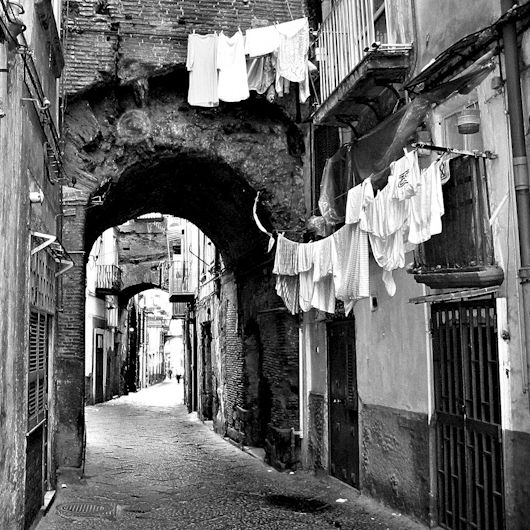About Daily Cusack
Blogs
- Rorate Caeli
- First Things blog
- Sancrucensis
- Ex Laodicea
- Millinerd
- American Conservative blogs
- Spoils of Egypt
- Sam Kriss
- Paraphasic
- Eunomia
- Irish Aesthete
- Classicist
News
- BBC News
- Daily Telegraph
- Spectator
- Catholic Herald
- First Things
- American Conservative
- New Criterion
- London Review of Books
- Frankfurter Allgemeine
- Neue Zurcher Zeitung
- ConservativeHome
- CapX
- Arts & Letters Daily
- Buenos Aires Herald

THERE ARE CITIES that defy the centuries; time does not change them. Empires succeed each other, civilisations leave their remains in them like geological strata, but they preserve their character through the ages, their peculiar ambience, the sound and rhythm which distinguish them from all other cities upon the earth. Naples is one of these cities, and it appears to the traveller today, as it was in the Middle Ages, and doubtless a thousand years before, half-African, half-Latin, with its terraced alleys, its street-cries, its smell of olive oil, charcoal, saffron and frying fish, its sun-coloured dust, the sound of bells ringing on the necks of horses and of mules.
The Greeks founded it, the Romans conquered it, the barbarians despoiled it, the Byzantines and the Normans each in turn took possession of it as masters. But they did no more than modify a little the architecture of its houses and add certain superstitions, a few legends, to the traditions of its streets.
The population is neither Greek, Roman nor Byzantine; the people are Neapolitan in perpetuity, a population distinct from all others in the world. Their gaiety is but a facade concealing the tragedy of poverty, their magniloquence an accent relieving the monotony of the daily round, their leisure a virtue in refusing to pretend to be busy when there is in fact nothing to do; its population is life-loving, meeting the setbacks of fate with guile, with a gift of speech and a contempt for all things military because peace never becomes boring. …


14 Jan 2016 12:34 pm
As F. Alfredo Sáenz S.J. wrote in his opera magna “La nave y las tempestades” about the history of the Church, and I do not quote exactly: “Nápoles, tantas veces conquistada, siempre terminó subyugando culturalmente a su conquistador”.